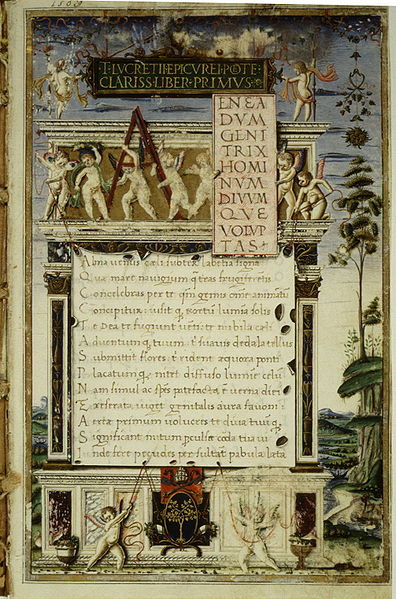
Lucretius: a series of articles by Emma Woolerton

Picture source
Thanks to David Meadows at rogueclassicism for pointing to the series of articles at The Guardian on Lucretius and his De rerum natura.
I enjoyed many parts of Stephen Greenblatt’s The Swerve: How the World Became Modern. Despite his caution not to read more into Lucretius’ influence on “the change from one way of perceiving and living in the world to another” during the Renaissance, Greenblatt seems to do just that in his book. I still recommend the book with that caveat—retelling the discovery of the lone surviving copy of the work and painting the world of Poggio Bracciolini (and other manuscript hunters, like Lorenzo Valla) proves to be compelling reading.
This series seems to provide a good introduction to Lucretius’ work and various aspects of it. The series is written by Emma Woolerton, who “wrote her PhD on Lucretius at Cambridge, where she taught for several years.” If there are more articles I will update this post.
Articles:
Lucretius, part 1: a poem to explain the entire world around us. The subject of Lucretius’s six-book poem De Rerum Natura was not war, love, myth or history – it was atomic physics.
Lucretius, part 2: all things are made of atoms. In Lucretius’s universe, there are atoms and there is void – completely empty space. Nothing else can be said to exist.
Lucretius, part 3: chaos and order. The atomic swerve is a simple idea that explains both the existence of the world and our ability to act freely within it.
Lucretius, part 4: things fall apart. A life too long lived is a misery in itself. When the body dies, the soul disperses as it is mortal like the world around us.
Lucretius, part 5: all perceptions are true. Everything we see is made up of the infinite atoms that swirl about us. These perceptions are the basis of our certain knowledge about the world.
Lucretius, part 6: not designed for life. The final two books of the poem end with a grim picture of plague and war. His challenge to the reader is to look at suffering and be grateful that we are safe.
Lucretius, part 7: becoming a god. Lucretius’s Epicurean philosophy doesn’t deny gods’ existence, only that they affect us. Instead, we must aim to be as them.
Lucretius, part 8: teachers and pupils. Lucretius’s didactic poetry addresses a single person but cajoles his readers to heed his lesson, as he learned from Epicurus.
Update: More links on Lucretius:
Llewelyn Morgan writes how De Rerum Natura is an epic poem with a revolutionary agenda
Dickinson College Commentaries provides a list of Lucretius editions on Google Books